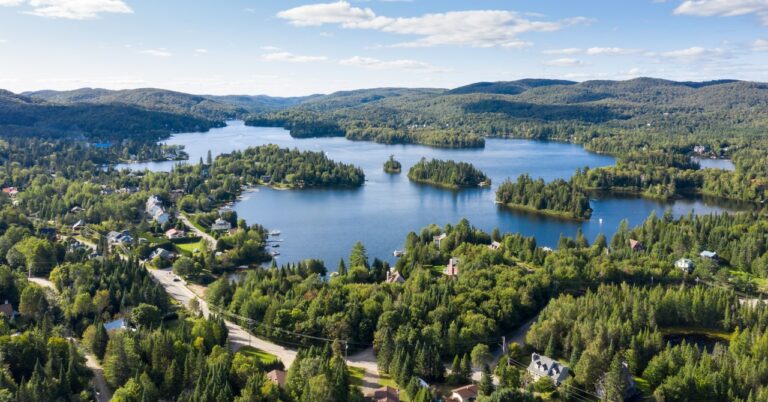
[ad_1]
This story initially appeared on Canada’s Nationwide Observer and is a part of the Local weather Desk collaboration.
As droughts, deteriorating farmland, and rising sea ranges push individuals all over the world from their properties, advocates in Canada are calling on the federal authorities to help those that are—and can be—displaced by the local weather disaster.
In August, Local weather Motion Community Canada (CAN-Rac), a physique of greater than 100 environmental teams throughout the nation, despatched a letter to Prime Minister Justin Trudeau and Immigration Minister Sean Fraser asking them to grant everlasting residency to all 1.7 million migrants in Canada, together with half 1,000,000 undocumented individuals. This “regularization” course of is vital to local weather justice, defined Caroline Brouillette, nationwide coverage supervisor for CAN-Rac.
“Combating the local weather disaster isn’t solely about lowering our emissions, it’s about how we look after each other—and that’s why we’re asking for this,” she stated.
Local weather change is already an element inflicting individuals to immigrate to Canada, stated Syed Hussan, the chief director of the Migrant Employees Alliance for Change (MWAC), which labored with CAN-Rac to ship the letter. However whereas local weather migrants come to the nation as employees, college students, or refugees, they “could not even be capable to describe their experiences having resulted from local weather change.”
He stated many migrants’ understanding of local weather change is that it causes poverty.
“Local weather change is definitely intently linked to financial deterioration,” Hussan defined.
Take farmers, for instance. Soil degradation is one in all local weather change’s best impacts, he stated. Poor soil means poor crops, forcing farmers to maneuver to cities and cities to search out work. However many fail to search out jobs in bigger city facilities, he added, leaving them no selection however to go away their dwelling nation and search alternatives in Canada.
Alongside poor crops, water shortage and rising sea ranges are among the many high drivers that the World Financial institution predicts will drive 216 million individuals emigrate inside their very own international locations by 2050. This estimate doesn’t account for individuals in Europe, North America, the Center East, or small island creating states like Barbados or Kiribati.
“For many individuals, the one possibility is to come back right here on some type of a short lived allow,” Hussan stated.
As soon as they make it to Canada, many nonetheless face appreciable hardship—which is why MWAC is advocating for all migrants, together with momentary international employees, to be granted everlasting residency. “An individual with out everlasting residency or citizenship doesn’t have equal rights in Canada,” Hussan stated.
A latest instance is a bunch of Jamaican migrant farm employees in Ontario who wrote an open letter to Jamaican Labour Minister Karl Samuda earlier final month saying they have been experiencing “systematic slavery,” with extraordinarily poor working situations that included crowded housing, publicity to harmful pesticides, and verbally abusive employers.
Hussan stated MWAC plans to suggest a “everlasting regularization program” to the federal authorities sooner or later however didn’t say precisely what this might seem like, aside from that it could permit for “everybody within the nation to have the identical immigration standing and the identical rights.”
Creating New Migration Pathways
In the meantime, some teams are calling on the federal government to make local weather change a viable purpose for migrants to get everlasting residency in Canada. Final 12 months, the Canadian Affiliation of Refugee Legal professionals (CARL) revealed a report outlining a number of choices the federal authorities may take.
It’s not possible for local weather migrants to come back to Canada as refugees, stated Rachel Bryce, an affiliate lawyer at Landings Legislation and in addition the cochair of CARL. Underneath Canadian legislation, refugees are outlined strictly as individuals exterior their dwelling nation with a well-founded worry of persecution resulting from their race, faith, social group, or political opinion.
CARL desires Canada to permit local weather migrants to realize standing beneath protected individuals laws. That is obtainable for individuals already in Canada who don’t qualify as refugees however would face important threat in the event that they returned to their dwelling nation.
Including local weather migrants to the protected individuals class would pave the way in which for everlasting residency if an individual may show their dwelling nation is not protected resulting from local weather change impacts. Whereas a selected local weather change class to “protected individuals” would require altering the legislation, it could even be attainable to amend the Immigration and Refugee Act to permit local weather migrants to remain on humanitarian and compassionate grounds, Bryce stated.
Canada is each one of many world’s largest emitters of greenhouse gases and one in all its largest fossil gas producers—and has a duty to bear for the local weather disaster, Brouillette stated. CAN-Rac has additionally burdened the significance of Canada taking motion to cut back its emissions.
“It’s about Canada doing its justifiable share of the worldwide effort to restrict warming to 1.5 levels and to take duty for our disproportionate contribution to the disaster,” Brouillette stated.
[ad_2]